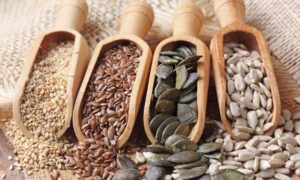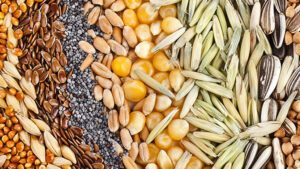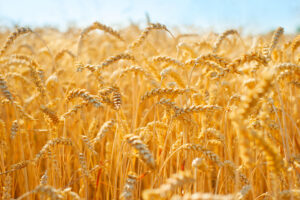
Ukraine will be able to export 50 million tons of grains and oilseeds from the 2023 harvest, as well as about 10 million tons of vegetable oils and meals to global markets, said Mykola Gorbachev, president of the Ukrainian Grain Association.
“We planned to export about 5 million tons per month. However, in the first four months (the grain marketing year starts in July – IF-U) this did not happen. We were unable to increase shipments through the Danube ports, which accounted for 3.5-3.7 million tons per month. With the launch of the grain corridor, the ports of Greater Odesa have a lot of potential. It is possible to ship 3-4 million tons (of grains and oilseeds – IF-U) per month through the ports of Greater Odesa alone,” he said at the Business Breakfast with Forbes Ukraine on Wednesday.
In total, Ukraine will be able to export about 6 million tons of grain a month through the sea corridor and across its western borders, according to the UGA president’s estimates, which was already done in November.
“We will be able to work harder, increase (exports – IF-U) a little bit more, and I think it will be technically feasible to supply 50 million tons of grains and oilseeds to foreign markets,” Gorbachev said.
He added that Ukraine will produce another 10 million tons of agro-processed products, including vegetable oils and meals.
“We will sell most of the grain and manufactured products. For us, this is more than 50% of the country’s foreign exchange earnings, which stabilizes the hryvnia. I think the state has little choice: either the harvest will rot or it is better to sell it. Of course, it’s better to sell,” said the UGA president and expressed confidence that traders will cope with this task if the military ensures the safety of shipping at the current level.
Gorbachev emphasized that in 2023 Ukraine managed to maintain its status as the world’s breadbasket, as farmers grew 81 million tons of grains and oilseeds against domestic consumption of 23-24 million tons. He emphasized that Ukraine produces three to four times more crops and processed products than it consumes, so the agricultural sector is clearly export-oriented.

Agrarians of all regions of Ukraine have threshed 57.6 million tons of grain and oilseeds, including 39.228 million tons of cereals and 18.457 million tons of oilseeds, the press service of the Ministry of Agrarian Policy and Food reported. According to the message, harvesting of grain and leguminous crops was carried out on the area of 8275.3 thousand hectares with a yield of 47.4 c/ha.
To date, Ukraine has completed collection and threshing of barley from 1505 thousand hectares (101% of the plan), which received 5.863 million tons, wheat – from 4695 thousand hectares (101%) collected 22.210 million tons, peas – from 154.4 thousand hectares (103%) received 396.8 thousand tons, as well as rape – from 1396 thousand hectares (98%) received 4.005 million tons of seeds.
Harvesting of millet, which from 77.4 thousand hectares (93%) received 162.4 thousand tons, and buckwheat – from 136.6 thousand hectares (97%) threshed 203.6 thousand tons. Corn from 1376.7 thousand hectares (34%) was threshed 9.282 million tons
In addition, 961.6 thousand tons of other cereals and leguminous crops were threshed from 331.2 thousand hectares.
Ukraine continues harvesting oilseeds, in particular, sunflower – 10.211 million tons (9.042 million tons a week earlier) from the area of 4.358 million hectares (86%), soybeans – 4.2411 million tons (3.776 million tons) from 1.641 million hectares (91%).
Sugar beet was dug from the area of 125.3 thousand hectares (96.4 thousand hectares a week earlier), which amounted to 50% of the planned area. It was received 5.912 million tons.
In connection with the revision of the forecast, the Ministry of Agrarian Policy monitors information on yields of all crops. Thus, wheat yield amounted to 47.6 c/ha, barley – 39 c/ha, peas – 25.7 c/ha, millet – 21 c/ha, buckwheat – 14.9 c/ha. Corn yield – 67.4 c/ha, rapeseed – 28.7 c/ha, soybean – 25.8 c/ha, sunflower – 23.4 c/ha. Yield of sugar beet – 471.9 c/ha.
As reported, winter wheat sowing this season amounted to 4166 thousand hectares (-834 thousand hectares to the previous season), winter barley – 536 thousand hectares (-255 thousand hectares), rape – 1374 thousand hectares (+110 thousand hectares).
The Ministry of Agrarian Policy noted that agrarians of Kyiv, Kirovograd, Mykolayiv, Poltava, Sumy, Cherkasy and Khmelnytskyi regions threshed more than 2 million tons of grain in each region. In Odessa, Vinnitsa and Dnipropetrovsk regions – more than 3 million tons each. Zaporizhzhya region has completed harvesting of grain crops.
According to the adjusted forecast of the Ministry of Agrarian Policy, in 2023 agrarians will be able to harvest 79.1 million tons of grain and oilseeds, of which grain crops will be produced in the following volumes: wheat – 21.7 million tons, barley – 5.7 million tons and corn – 28.5 million tons. Gross production of oilseeds will reach 21.6 million tons, in particular, sunflower – 13 million tons, rapeseed – 4 million tons, soybeans – 4.6 million tons. The sugar beet harvest is forecasted at 13.7 million tons.
As reported, at the beginning of spring 2023, the total gross harvest for the current year was forecast at 63.5 million tons, or 13% less than in 2022. In June, after harvest began, the forecast was raised to 68 million tons, (7% less). In early September, due to favorable weather conditions, the forecast was revised upward to 76.7 million tons.

Kernel, one of the largest agricultural holdings in Ukraine, has almost completed harvesting winter wheat on an area of 60 thousand hectares and winter rapeseed on 10 thousand hectares, noting an increase in yields and forecasting an increase in production of all crops in the 2023 season, the company said in a statement on the Warsaw Stock Exchange.
According to the report, in the 2023 season, the agroholding expanded the area under winter wheat by 1.7 times, and winter rapeseed by twice compared to last year. Favorable weather conditions resulted in higher yields of these crops: winter wheat yields reached 6.6 t/ha, which is significantly higher than a year earlier, when it was 4.6 t/ha; winter rapeseed yields were 3.3 t/ha, compared to 2.5 t/ha a year earlier.
“Kernel has also allocated significant areas for spring crops, including 120 thou hectares of sunflower, 84 thou hectares of corn and 65 thou hectares of soybeans.
“Risks for the group’s spring crops (corn, sunflower and soybeans) are currently limited, so the group expects to get yields close to historical averages,” the agricultural holding said.
“Kernel assesses the harvest prospects in Ukraine as “generally favorable” and forecasts an increase in grain and oilseed production compared to the previous year.
Speaking about the prospects for sales of the grown products in FY2024, the baseline scenario of the agricultural holding envisages exports only through the Danube River ports and inland routes due to the susceptibility of agricultural infrastructure to destruction caused by Russia’s regular missile attacks.
“Kernel has already secured some capacity to export sunflower oil and meal, but has not yet secured a stable and cost-effective grain transshipment option. The agroholding announced the need for additional investments to increase grain export capacity and reduce logistics costs.
“At the beginning of the season, the profit forecast for FY2024 envisages a significant decrease in EBITDA due to the undermined productivity of the agriculture, infrastructure and trade segments, which is caused by relatively weak global grain prices and expensive export logistics,” the agricultural holding explained.
At the same time, Kernel expects the oilseeds processing segment to be the main source of profit for the group in fiscal 2024.
The agroholding reported that it does not have access to credit limits from banks and relies on accumulated cash. At the same time, it continues negotiations with various financial institutions to obtain CapEx loans.
Uncertainty over VAT refunds in the future and the possible risk of hryvnia devaluation also increase the agroholding’s exposure to foreign exchange losses.
“Any estimates of volumes and margins are very sensitive to the current operational situation in Ukraine due to the constant disruptions caused by the war. The holding’s work is aimed at reducing further risks of losses caused by possible future Russian attacks,” Kernel summarized.
Before the war, Kernel was the world’s leading producer of sunflower oil (about 7% of global production) and its exports (about 12%). The company is one of the largest producers and sellers of bottled oil in Ukraine. In addition, the agricultural holding is engaged in the cultivation and sale of agricultural products.
The largest co-owner of Kernel through Namsen Ltd. is Ukrainian businessman Andriy Verevsky, who this year increased his stake from 41.3% to 74.05% as part of the buyout and delisting of the company from the Warsaw Stock Exchange.
Kernel’s net profit for the first nine months of FY2023 (July 2022 – March 2023) increased by 36% to $437 million, while revenue fell by 45% to $2.715 billion.

According to the results of the spring sowing season 2023 in Ukraine, farmers increased the areas under grain crops, particularly corn, and reduced the areas under oilseeds, particularly sunflower, and will get 61.4 million tons of gross crop of these crops, according to the website of the Ukrainian Club of Agrarian Business (UCAB) on Tuesday.
It is specified that such changes are fixed compared to the previous UCAB forecast, but not to the previous year. The forecast also raised yield expectations for winter crops.
UCAB estimates that the 2023 crop area will be 10.1 million hectares (4.4 million hectares of wheat, 3.8 million hectares of corn and 1.4 million hectares of barley). As a result, it is expected to harvest 42.5 million tons of cereals, of which 16.3 million tons of wheat, 21.1 million tons of corn and 4.2 million tons of barley.
Experts estimate the area under oilseeds at 8.9 million hectares, including 5.7 million hectares of sunflower, 2 million hectares of soybeans and 1.2 million hectares of rape. It is noted that Ukraine can expect to get the gross yield of oilseeds at 18.9 million tons, including 12.2 million tons of sunflower, 3.8 million tons of soybeans and 2.9 million tons of rapeseed.
“According to preliminary estimates, this harvest will fully meet domestic demand and get the export potential at 43 million tons of grains and oilseeds,” forecasts UCAB.
Analysts attributed the lion’s share of last year’s corn harvest, which was in high demand, to the positive factors of the current season. The expansion of area under this crop will contribute to the world tendency to reduce prices for fertilizers, which will be felt in Ukraine as well and this will provide maize with their sufficient quantity.
They advised to remember that the introduction of corn production has certain technological difficulties for farmers: the current high saturation with oil-bearing crops, the possible further disease pressure, increased load on combines because of the overlap of harvest periods of other crops, the lack of quality seeds of other crops, etc.
The UCAB also pointed out that since the beginning of the war, the main consumers of oilseeds were EU countries, primarily neighboring countries. However, because of the temporary restrictions on imports of some grains by them, further increase of areas sown with oil-bearing crops looks risky.
According to analysts, Ukraine managed to survive the Russian energy terror and adapt to the new realities, gives hope to the ability of farmers to withstand a possible repetition of the situation.

Over the past week, farmers sowed 210.3 thou hectares of grains and legumes compared to 66.6 thou hectares a week earlier, with Ternopil region leading the way with 47.2 thou hectares, the Ministry of Agrarian Policy reported on Friday.
According to its data, as of March 23, the sowing campaign is already underway in 18 regions of Ukraine, while a week ago it was in 10.
It is noted that since the beginning of this campaign, all categories of farms have sown 293 thousand hectares of grain and leguminous crops, of which 76.1 thousand hectares (26 thousand hectares a week earlier) – spring wheat, 168.1 thousand hectares (44.2 thousand hectares) – spring barley, 35.3 thousand hectares (12 thousand hectares) – peas and 14.2 thousand (0.5 thousand hectares) – oats.
The Ministry clarified that since the beginning of the sowing campaign, farmers in Ternopil region have planted the largest amount of grain and legumes – 67.6 thousand hectares.
Agrarians in Vinnytsia, Volyn, Rivne, Khmelnytsky and Cherkasy regions have started sowing sugar beet, while farmers in Odesa region have started sowing sunflower, the ministry added.
As reported, as of March 25 last year, 150 thousand hectares of agricultural areas were sown in 11 regions, and in 2021, as of the same date, 106 thousand hectares were sown.
As of March 21, 2023, the Ministry of Agrarian Policy forecasted the area under grain and leguminous crops for the 2023 harvest in the territory controlled by Ukraine at 10.24 mln ha, which is 1.41 mln ha or 12.1% less than in 2022.
According to the data and forecasts of the Ministry of Agrarian Policy, winter wheat plantings amounted to 4166 thou hectares (-834 thou hectares y-o-y), winter barley – 536 thou hectares (-255 thou hectares).
The agency expects spring wheat to be planted on 285 thou hectares (+67 thou hectares), spring barley – on 1041 thou hectares (+111 thou hectares), corn – on 3618 thou hectares (-451 thou hectares).

Ukraine exported in January “grain corridor” by 25% less agricultural products than in December due to deliberate actions of Russian inspectors to delay ships in the Bosphorus, the Administration of Sea Ports of Ukraine (AMPU) reported on Sunday.
According to the agency, in January the ports of “Big Odessa” processed 77 ships and sent 3 million tons of agricultural products to Africa, Asia and Europe, while in December the figure was 97 ships and 3.7 million tons of agricultural products, respectively.
At the same time, the Ministry of Infrastructure of Ukraine noted that the critically low rate of ships’ departure from the ports (2.5 ships per day) continues to remain. For comparison, in October this indicator was 5.7.
“In January, the ports worked only at 30-40% of capacity due to a shortage of the fleet to load. Three ships a day at the proposed nine are inspected in the Bosphorus and receive permission to move to Ukrainian ports for food,” – added in the ministry.
According to the ministry, the SKC plans to conduct 10 inspections a day, but Russian inspectors successfully complete only half of them.
“In January, 204 inspections were conducted, of which 173 were successful, another 31 inspections were not completed because Russian inspectors ended their workday prematurely and unilaterally at 3 p.m. 30 minutes (work time is regulated till 5:30 pm) or due to claims of documents not having been checked by the SKZ,” added the Ministry of Infrastructure.
In addition, the registration of vessels for participation in the initiative is also delayed. With more than 80 ships declared, the representatives of the aggressor country register 2-3 ships a day without any explanation. As of February 4, 120 vessels are waiting for inspection in Turkish territorial waters (98 – entering the ports for loading, 22 – with the agricultural products for the exit). The vast majority of them are waiting several weeks.
In total, for six months of operation of the “grain corridor” ports of Greater Odessa has sent 691 ships with 19.7 million tons of foodstuffs: the port of Chernomorsk – 285 ships-7.3 million tons, port “Odessa” – 215 ships-5.2 million tons and port “Pivdenny” – 191 ships with 6.6 million tons of food.
“The world received 19.7 million tons of food, and should receive more than 30 million tons, subject to the stable functioning of the corridor,” the department added.
As reported, in Istanbul on July 22 with the participation of the UN, Ukraine, Turkey and Russia signed two documents on the creation of a corridor for 120 days for the export of grain from the three Ukrainian ports – “Chernomorsk”, “Odessa” and “Pivdenniy”. After the end of its validity period, the agreement was extended for another 120 days, starting from November 19, 2022.